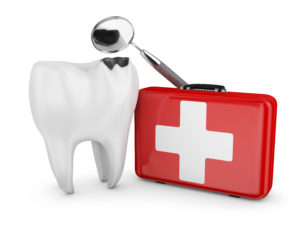 The moment you have a bad fall and your mouth is in serious pain, it’s understandable if you start to panic. However, just because a tooth is knocked-out doesn’t mean you’ll need to start thinking about dental implants just yet. In fact, there is a way to save it for reimplantation, as long as you follow these steps from your emergency dentist in Virginia Beach.
The moment you have a bad fall and your mouth is in serious pain, it’s understandable if you start to panic. However, just because a tooth is knocked-out doesn’t mean you’ll need to start thinking about dental implants just yet. In fact, there is a way to save it for reimplantation, as long as you follow these steps from your emergency dentist in Virginia Beach.
The Moment Your Tooth is Knocked-Out
It’s important to stop any bleeding that’s occurring before you do anything else. This can be done by taking a clean rag and applying pressure to the newly-empty socket. Afterwards, start by searching for the tooth. Once found, pick it up only by the crown, which is the top part. Avoid touching the root or removing any tissue that’s still connected. Doing so will reduce it’s chances of being usable.
Next, clean any dirt or debris that’s on the tooth. This can be done with either saline solution, saltwater, or milk. If you must use plain water, make sure it is warm and not touching the root. Water can cause the cells still attached to the root to swell up and burst.
Once cleaned, make sure to keep the tooth moist. This can be done in a number of ways.
- Place it in a container of milk.
- Place it back into the socket. Gently bite down to keep it in place.
- Stick it between your cheek and gum, however this is not recommended for children, who may accidentally swallow it.
Once you’ve stabilized, contact your emergency dentist in Virginia Beach and schedule an appointment for the same day.
How Milk Can Help Your Emergency
It’s very important for patients to get to their dentist within the hour if they want the best chances for reimplantation. While multiple liquids can sufficiently keep the tooth moist, milk has unique properties that work to preserve teeth even better, buying you some extra time.
For example, milk contains proteins that keep the acid-to-alkaline ratio constant. It also contains sugars, enzymes, and proteins that help the cells still attached to the tooth heal more quickly, prolonging its preservation. As a bonus, milk contains anti-bacterial properties, which is why your dentist recommends it for good dental health.
How Your Dentist Will Help
Once you arrive, your dentist will say that you’ll need a root canal. All avulsed teeth require root canals because the nerves, blood vessels, and supporting tissues are permanently damaged. If the process is simple, she’ll flush debris from the socket and place it back in. Then, she’ll splint the tooth to teeth on either side to keep it in place. If the bone around the tooth is still intact, it will take about three to four weeks to reattach. Your dentist will also schedule you for a follow-up to confirm no infection is present.
To save your tooth and extra money, just follow these steps. Before you know it, your smile will be restored! If you’re having a dental emergency, schedule an appointment today!
About the Author
Dr. Asra Javeed earned her DMD degree from the Boston University School of Dental Medicine. She’s received multiple awards for her expertise in oral pathology, so you can trust her when it comes to reimplanting teeth. To learn more about her practice or schedule an emergency visit, contact her through her website.

